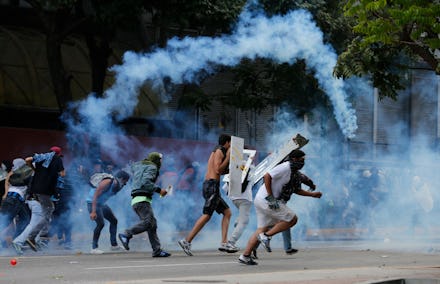Venezuela Tells Citizens to Celebrate Carnival – These Protesters Have Something Else in Mind

Tens of thousands of Venezuelans are ignoring government calls to go to the beach for the country's Carnival celebration. Angry at the violence of the pro-government forces that have killed 18 people and still unable to afford basic necessities, they have chosen to skip the national holiday.
Instead, citizens are continuing what have become national protests calling for President Nicolas Maduro's resignation. Traditionally, the celebration that precedes lent entails decorative parades and relaxing beach days. But the country's extremely high inflation rates coupled with increasing unemployment has meant new realities for Venezuelan citizens.
Confusion still surrounds the uprising. Many question the motives of some anti-government leaders that have risen up from what began as a peaceful student-led movement. Others cite the U.S. supported coup of democratically-elected Hugo Chávez as reason to reject anti-government demands. At the same time, protesters point to the country's repressive crackdown on citizens, its inability to keep food prices affordable and rampant corruption as reasons to overthrow the president. Despite unified grievances, reports reveal many Venezuelans are still unsure of what real reform would look like. As the majority of Venezuela rallies for change, one thing is clear: They will not be taking a holiday.
1. Nothing to celebrate
"We have nothing to celebrate at the beach," engineer Carlos Torres, 34, told Reuters.
2. Tired of abuse
"We love a long weekend, but ... we're tired of the shortages, the delinquency, the abuse," said 40-year-old travel agent Jennifer Diaz in an interview with Reuters. "They can declare holidays all year long, but we're going to stay in the streets."
3. State TV broadcasting the beach
State TV is broadcasting images of packed beaches and smiling citizens, encouraging the country to stop protesting.
4. Insult to injury
Protesters say the holiday was an attempt to undermine the demonstrations and many anti-government mayors cancelled ceremonies.
5. Over 200 injured
Over 200 protesters have been injured since demonstrations began.
6. Student unity
"Today again demonstrated that the people of Venezuela are with the students," one student leader said to Bloomberg.
7. At least 18 people have been killed.
Eighteen people have been killed since the protests began, according to reports.
"Nobody is tiring here, and we're all going to fight until (the government) falls," said one protester.
8. Economic hardship propels protests.
The country has seen a 56% annual inflation rate, driving the cost of food and basic resources through the roof.
9. Active smear campaign
Information Minister Delcy Rodriguez in an interview with HispanTV called the protests "fascist attacks" and declared the government's response in line with human rights standards.